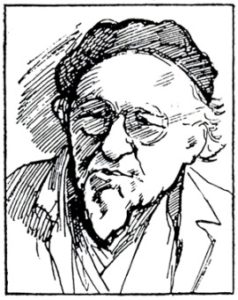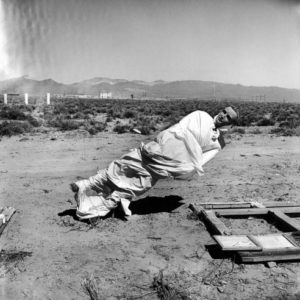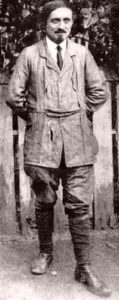IN MEMORIAN
A Emile Armand, anarquista individualista, como ofrenda de profunda admiración y gran cariño.
M. G. I.
Continue reading STIRNER (26 octubre 1806 – 23 de junio 1856) x Miguel Gimenez Igualada
Tag Archives: Emilè Armand
“El Stirnerismo” x Emile Armand
Max Stirner vio la luz en Bayreuth (Baviera) el 25 de octubre de 1806. No fue un escritor de una fecundidad extraordinaria, pues los cuidados de la existencia le acapararon demasiado tiempo. De sus escritos, sólo uno se ha mantenido a flote, un volumen en el cual se entregó por entero, en el que expresó todo su pensamiento y procuró indicar un camino de salida a los hombres de su tiempo: El único y su propiedad.
Continue reading “El Stirnerismo” x Emile Armand
[Libro] Formas de vida en común sin Estado ni Autoridad – Émile Armand
LAS EXPERIENCIAS ECONÓMICAS Y SEXUALES A TRAVÉS DE LA HISTORIA
Desde que comenzó la amplia difusión de las ideas colectivistas, comunistas, cooperativistas y anarquistas (comunistas e individualistas), se han encontrado partidarios de estas doctrinas o concepciones para poner en práctica sus teorías. Diferentes móviles les impulsaban: Tan pronto se trataba de demostrar la practicabilidad de las tesis que sus adversarios pretendían irrealizables, como se proponía anticipar el advenimiento de la «Sociedad futura» o del «Reino de los Cielos», cuya venida tarda tan largo tiempo a juicio de la impaciencia sincera. Ciertos cristianos, socialistas o anarquistas, intentaban simplemente vivir al margen o apartados de una sociedad, en la que no podían soportar más la estructura antifraternal, la opresión capitalista o las bases autoritarias, según el caso.
Continue reading [Libro] Formas de vida en común sin Estado ni Autoridad – Émile Armand
“El Stirnerismo” x Emile Armand
Max Stirner vio la luz en Bayreuth (Baviera) el 25 de octubre de 1806. No fue un escritor de una fecundidad extraordinaria, pues los cuidados de la existencia le acapararon demasiado tiempo. De sus escritos, sólo uno se ha mantenido a flote, un volumen en el cual se entregó por entero, en el que expresó todo su pensamiento y procuró indicar un camino de salida a los hombres de su tiempo: El único y su propiedad.
Continue reading “El Stirnerismo” x Emile Armand
Articles from “Machete” #1
Various Authors
The Machete
The machete is a long knife with a single edge, particularly intended for opening a way when you find yourself surrounded by a hostile environment that prevents you from going down your path, paralyzing all movement. The Machete isn’t elegant; it doesn’t have the discretion of the dagger or the precision of the scalpel. When it strikes, it doesn’t distinguish between the innocent flower and the noxious weed, and it destroys both without distinctions. Heavy and uncomfortable to carry, the Machete can prove indispensable in difficult situations, when there is no time to lose in scientific calculations, exploratory reconnaissance, diplomatic consultations. If need be, it can even be used as an offensive tool. And then — it is said — it can become a terrifying weapon.
Is the Illegalist Anarchist our Comrade? by emile armand
When we consider the thief as such we can’t say that we find him less human than other classes of society. The members of the great criminal gangs have mutual relations that are strongly marked with communism. If they represent a survival from a prior age, we can also consider them as the precursors of a better age in the future. In all cities they know where to address themselves so they’ll be received and hidden. Up to a certain point they show themselves to be generous and prodigal towards those of their milieu. If they consider the rich as their natural enemies, as a legitimate prey — a point of view quite difficult to contradict — a large number of them are animated by the sprit of Robin Hood; when it comes to the poor many thieves show themselves to have a good heart.
Continue reading Is the Illegalist Anarchist our Comrade? by emile armand
El anarquismo individual, lo que es vale y puede – Émile Armand
En 1908 hice editar por la imprenta de Conversaciones populares, entonces bajo la influencia de Alberto Libertad, un estudio intitulado ¿Qué es un anarquista? y me esforcé en el transcurso de la obra por situar al anarquista, bajo el ambiente exterior y en su propio medio.
Continue reading El anarquismo individual, lo que es vale y puede – Émile Armand
Émile Armand (21 texts)
Is the Illegalist Anarchist our Comrade?
Émile Armand (1911)
(Notes: From “L’Illégalist anarchiste, est-il notre camarade?” Paris and Orleans, Editions de “l’en-dehors.” [n.d].Translated for marxists.org by Mitchell Abidor.)
When we consider the thief as such we can’t say that we find him less human than other classes of society. The members of the great criminal gangs have mutual relations that are strongly marked with communism. If they represent a survival from a prior age, we can also consider them as the precursors of a better age in the future. In all cities they know where to address themselves so they’ll be received and hidden. Up to a certain point they show themselves to be generous and prodigal towards those of their milieu. If they consider the rich as their natural enemies, as a legitimate prey — a point of view quite difficult to contradict — a large number of them are animated by the sprit of Robin Hood; when it comes to the poor many thieves show themselves to have a good heart.
(Edward Carpenter: Civilization, its Cause and Cure.)
I am not an enthusiast of illegalism. I am an alegal. Illegalism is a dangerous last resort for he who engages in it, even temporarily, a last resort that should neither be preached nor advocated. But the question I propose to study is not that of asking whether or not an illegal trade is perilous or not, but if the anarchist who earns his daily bread by resorting to trades condemned by the police and tribunals is right or wrong to expect that an anarchist who accepts working for a boss treat him as a comrade, a comrade whose point of view we defend in broad daylight and who we don’t deny when he falls into the grips of the police or the decisions of judges. (Unless he asks us to remain silent about his case)
Continue reading Émile Armand (21 texts)
Individualismo anarquista y camaradería amorosa.
Emile Armand
Edición
Ateneo Libertario Ricardo Mella. A Coruña
Ateneo libertario Al Margen. Valencia
Ateneu Enciclopèdic Popular. Barcelona
Ateneo Libertario de Sant Boi
Ateneu Llibertari Poble Sec. Barcelona
Fundació D’Estudis Llibertaris i Anarcosindicalistes. Barcelona
Etcétera. Barcelona
Barcelona, septiembre 2000
Continue reading Individualismo anarquista y camaradería amorosa.
L’illegalista anarchico di Emilè Armand
Émile Armand
(Parigi 26 Marzo 1872 – Rouen 19 Febbraio 1962)
Anarchico individualista francese.
Continue reading L’illegalista anarchico di Emilè Armand








